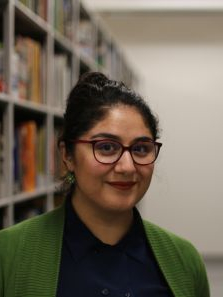
Racquel Gonzales
Ph.D. in Visual Studies, 2017
Research is never all fun and games. Even when you study games. “My childhood was filled with D.A.R.E., Amber Alerts, and ‘America’s Most Wanted,’” says Racquel M. Gonzales, a Ph.D. alumna of the University of California, Irvine’s visual studies program. Her dissertation, “Playing Detective: Procedure, Reenactment, and Crime-Solving Technologies,” draws from this context of hyper-surveillance in her surroundings to explore the emergence of policing as a form of American leisure culture. An interdisciplinary scholar who was trained in cultural studies, critical race theory, and gender and sexuality studies, Gonzales’ research was inherently political. “I wanted to dig into long-standing cultural perceptions of what supposedly is and isn’t police work and how that shapes perceptions of citizenship,” she explains. “In other words, who is actually hailed to play detective and who is criminalized in order for this type of play to work?”The question of who gets to play is still central to Gonzales' work as research historian for The Strong National Museum of Play and assistant editor for the American Journal of Play (the publishing arm of the museum). She consistently draws on the critical methods she applied to her dissertation in order to conduct research on the museum’s archival objects for exhibit narratives. While she no longer explicitly studies surveillance in her current work, her expertise in game studies, play studies, and media history inform her position as a historian concerned with more inclusive research in play studies. The Strong is currently undergoing a major expansion campaign, and Gonzales is heavily involved with research and case-planning for one of the new exhibit galleries.
It seems almost destined that Gonzales would work at The Strong. While she had not initially planned to go into museum work, she had been fascinated with exhibition studies from a scholarly perspective at UCI. She took classes that cultivated this curiosity and allowed her to tie museum studies into her research. In fact, she even conducted onsite archival research at The Strong for her dissertation years before she stumbled upon the job posting on Facebook.
“Reading the job description was an uncanny experience,” Gonzales admits. The museum was looking for someone with expertise in the fields that she had trained in. She felt that she could fit the position. When she recalls doing her dissertation research at the museum, she remembers thinking that it would have been an amazing place to work. “But [I] did not know a position like this even existed,” she says. Four months of phone, Skype, and in-person interviews later, Gonzales was offered the position. She made the cross-country move from Southern California to upstate New York in May 2018.
After she finished her Ph.D. in 2017, Gonzales worked as a writing lecturer for UCI’s composition program. She was familiar with the courses because she had served as a teaching assistant for the program while she was a graduate student. While she found the experience of working in a rigorous pedagogical environment with generous colleagues rewarding, she wrestled with the prospect of precarious year-to-year contract renewals and began considering possibilities beyond academia. When a member of her family passed away during one of her teaching sessions in the summer, Gonzales stepped back from the university to give support to her family in Texas. “The absence gave me time to reassess big questions,” she says. “[such as] the work I wanted to do, what job markets I could pursue, etc.” She was just making peace with packing up her media historian toolkit when she saw the job posting for The Strong.
“I felt excitement about trying something new,” Gonzales says. “But [I] also dealt with some sense of loss at leaving an environment that allowed me to dig into research and teach.” She was having trouble imagining how she could apply her training as a scholar and educator outside of the academic sphere. “I do believe the time away from academia reminded me that a classroom is not the only place where I could educate,” she says. “My research does not define the limits of what I can do.”
When asked how she thinks graduate school training prepared her for her current position, Gonzales says that the questions regarding ways of seeing in visual studies continue to resonate and circulate in her mind as she works with the Collections and Exhibits Team. She emphasizes that managing research and writing with teaching and service obligations in graduate school taught her the valuable skill of multitasking, which is indispensable in order to complete multiple short and long-term projects at the museum. She also values the experience she gained with programming and development while working with Dr. Julia Lupton in the UCI Humanities Center (formerly Humanities Commons) and with Illuminations. “I am incredibly grateful for her mentorship,” Gonzales says. “That practical programming experience was one of the reasons I felt my resume stood out, despite not having work experience in a traditional museum space.”
Gonzalez has three pieces of advice for graduate students learning to navigate the job market: Focus on translating academic achievements into skills for the work place; consider what exactly you enjoy about you academic experience and look for opportunities that require those kinds of skills; and kindness is free. “One of the most rewarding aspects during this process has been extending gratitude to the people in my network for their support and encouragement,” she says. “The job market navigation can be very isolating, so try not to feel shy about reaching out to people who have supported you.”
